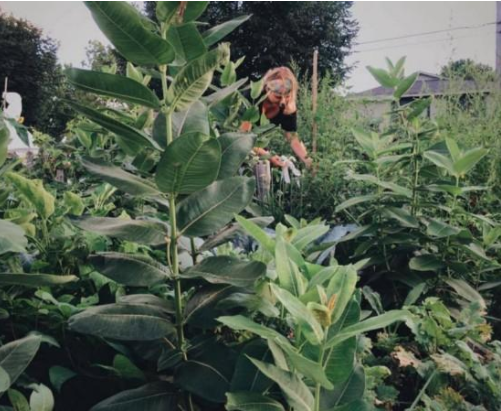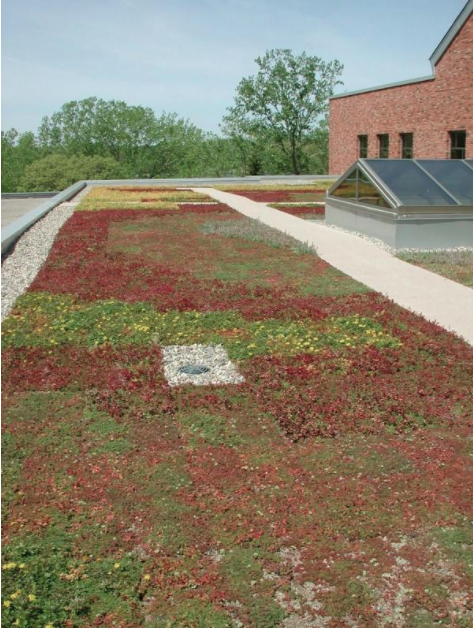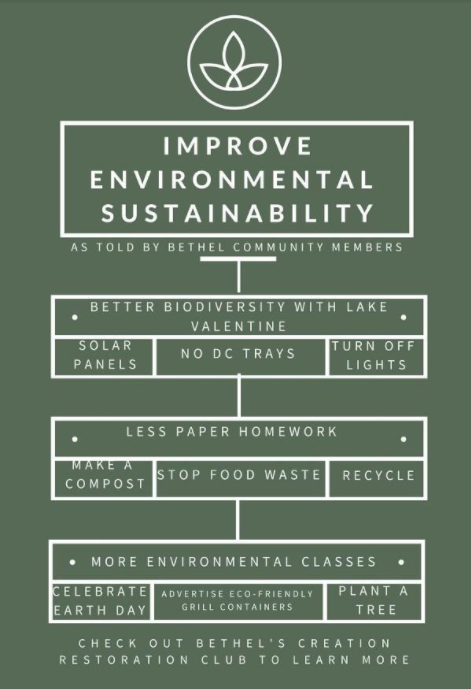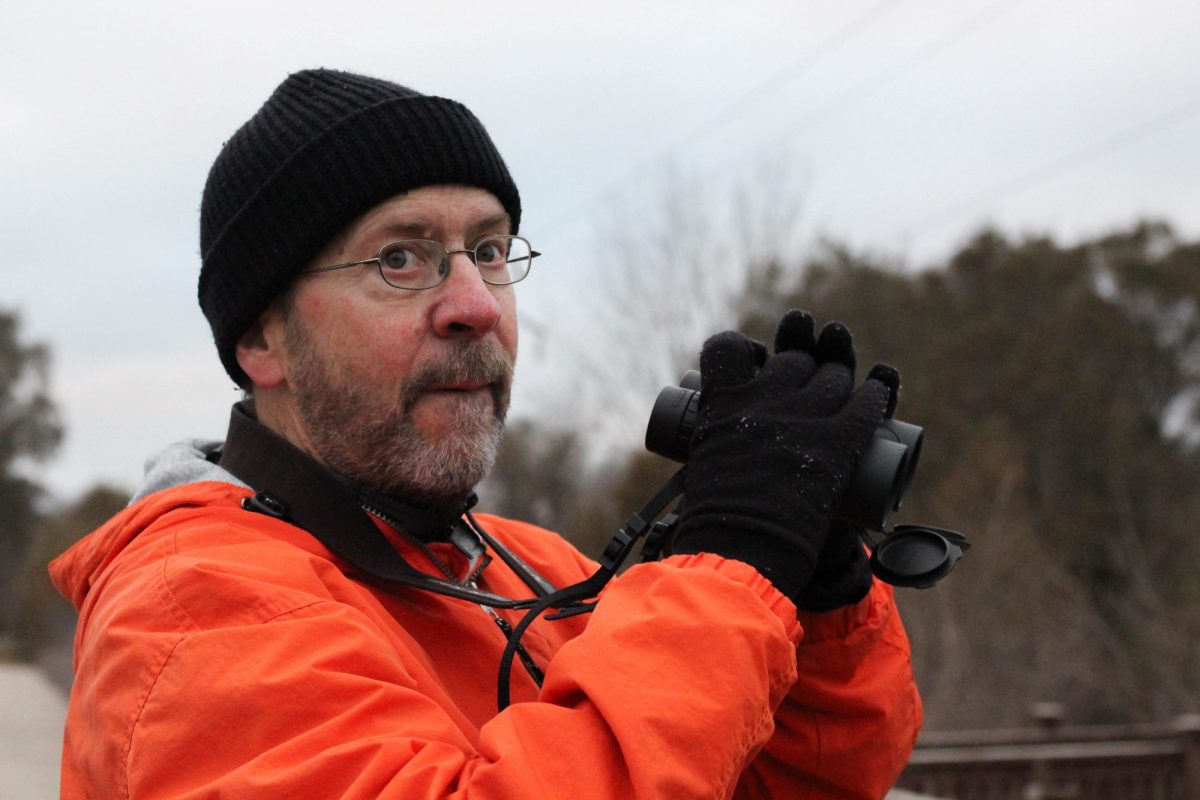Bethel University ponders on what it means to be environmental Christians.
By Madison Pawlyshyn
The heat rose to a scorching 90 degrees, and his lawn stuck out like a missing puzzle piece — crisp, dry and gasping for air. All around Andover, other lawns gushed with sprinklers, water working as hard as it could to keep the bright green colors alive. Ken Petersen’s yard sat and watched.
Petersen has been an environmental professor at Bethel University for 13.5 years. From raising a family of three, to teaching a full load of classes, to conducting research and to pursuing a passion for the environment, Petersen’s life is full. On brisk early mornings, his students go outside, analyzing different species growing around Lake Valentine. Petersen crouches down beside them, dirt on his hands, instructing and engaging with the class.
“I love taking my students outside to have practical content,” Petersen said.
Petersen is different because he not only calls himself an environmentalist, but an environmental Christian.
“I am an environmentalist precisely because I am a Christian. I love what the creator loves.” -Ken Petersen
Petersen began calling himself an environmental Christian once he began studying environmental and ecological topics at Dordt College in 1975. Petersen sat and pondered his identity, rolled his eyes, threw his arms in the air and undoubtedly knew. It seemed like a no brainer for him.
“I am an environmentalist precisely because I am a Christian. I love what the creator loves,” Petersen said.
Kiersti Phenow, a senior social work and reconciliation studies major at Bethel, also illustrates her love for the environment. By participating in multiple projects like working at a community garden in the Frogtown neighborhood of Minneapolis, Phenow believes that being mindful stewards is very important. She follows Petersen’s point of view of what it means to be an environmental Christian.

“I don’t think that those two terms are mutually exclusive,” Phenow said. “The word ‘Christian’ is included in that. I think we all should be environmentalists.”
Yet, being a Christian can often get in the way and deter one’s actions to protect the creation. Victor Ezigbo, the chair of the biblical and theological studies department at Bethel explained that since Christians know their life on earth is temporary, and life in heaven is eternal, followers use this knowledge as a way to avoid taking care of the planet. Looking at his congested shelf with a never ending bundle of historical, theological and religious texts, Ezigbo stood on his toes, and delicately pulled a small torn Bible from the top shelf.
“(Scripture) calls us to be active agents in God’s providential work in the world. God invited human beings to be a part of the creation,” Ezigbo said.
Ezigbo further admitted that sometimes even theologians get caught up in theological arguments. They forget that scripture makes it clear of God healing and recreating creation. Petersen agrees with Ezigbo, realizing that many evangelicals are weak in the Word.
“If you are weak in the Word, you don’t realize parts of the word like taking care of the creation,” Petersen said.
Students also admitted to their struggles in how to properly protect God’s creation, and wondered what actually needed to be done.
“I’m conscious of what we have to do, and I do what I can, but I don’t go out of my way to do more,” sophomore business major Kara Otto said.
“Parts of nature aren’t just pretty props on a stage, they are part of a very complex web of life that we all belong to.” -Ken Petersen
Whether actively taking giant strides to better the creation, or occasionally taking some little steps, people ponder why God calls for stewards of his planet. According to Petersen, being a steward of creation means being conscious and loving towards what God made. He explained that God wants everyone to respond to the creation the same way he does, with diligence and care.
“Parts of nature aren’t just pretty props on a stage, they are part of a very complex web of life that we all belong to,” Petersen said.
In order to become better stewards of God’s creation, students and faculty described what that looks like and how Bethel as a community can better protect, appreciate and help the environment.
The thorns clung tightly to their pants, they caught on to every swinging ponytail, they stuck to every flopping shoe lace. Buckthorn covers the entire natural woods of Bethel University, and the Creation Restoration club works every fall to get it under control due to its takeover of other species. This is just one of many projects that the club undergoes, encouraging students to get more involved in helping Bethel and surrounding communities with environmental issues.
“We try to create an awareness and a heart for the creation,” said Petersen, the director of the club.
Compared to other colleges, Petersen believes that Bethel is doing quite well in terms of being stewards of the planet. He sees the community as being careful and conscious with its appearance. Specifically, Petersen is proud of Bethel’s green roof that hovers above the Brushaber Commons, a place to grow plants and food that many students and faculty are unaware of.

Bob Kistler, the former head chair of the environmental department, and now research library employee, sees Bethel’s efforts as good, but not enough.
“Bethel has a good heart, and whatever environmentally expedient, Bethel does. However, they don’t always go to the next level, due to being tuition driven,” Kistler said.
From watching the seasons emerge out of the depths of the earth to hearing the bird’s first cries of dawn, this is what Kistler lives for. One way he helps the creation is by merely being in it, by appreciating God’s handy work.
“I walk back and forth through campus or ride my bike to work everyday; not just for exercise, but to see what’s really going on in the world, ” Kistler said.
In comparison to a simple appreciation and time well spent in nature, Ezigbo and Phenow agree that discussion and education needs to happen on Bethel’s campus in order to help the environment. Phenow believes that improvement can only happen if conversation arises about how to be reconcilers.
“There should be an intentional curricular strategy towards being stewards,” Ezigbo said.

Not only at Bethel can steps be done to better the environment, but Petersen lives a sustainable life at home also. Outside his house sits a small garden, congested with splashes of reds, greens and yellows. Little hands pick up dirt and scavenge the tasty food they can put in their mouths. Petersen sits beside his kids, teaching them the basics of living a sustainable life.
“The more contact you can make with the creation, the more healthy attitudes you will have towards it,” Petersen said..
And yet, it’s a fuzzy topic. One where no one really knows the true answer. It continues to be present in every late night debate, every neverending election and every argument between the grandparents. Being an environmentalist has become a political issue, but why. Go back 40 years or so, and Peterson remembered when protecting the creation wasn’t so complicated.
“It wasn’t a liberal thing, it was an everyone thing. It hasn’t always been like this back then,” Petersen said.
However, now being an environmentalist is nailed sturdy with labels like frames on a wall. Between having the label of liberals, conservatives, Christians and beyond, environmentalist are judged in one way or another. People outside and inside the Bethel community don’t understand how that came to be, and wonder who should be the real environmentalists.
“I think that as Christians, if we are living out our duty, we should automatically be environmentalists,” junior missional ministries major Maddy Mowrey said.
“Being an environmentalist is a human right and a human responsibility. It’s caring for a sacred life that is as alive as we are.” -Kiersti Phenow
Others agree that no label should be given to environmentalists. Robbie Edwards, a senior art major at Bethel, believes that the minute a label is put on something, it can no longer be reached by people. Labels divide, labels exclude and labels jump to conclusions.
“Being an environmentalist is a human right and a human responsibility. It’s caring for a sacred life that is as alive as we are,” Phenow said.
However, Petersen puts all political matters aside, and tucks all controversies under his seat. His first loyalty is to the kingdom of God, not a political party. He wishes he could vote for the kingdom, not for a candidate, yet the option is far present.
“I don’t like that discord with having to choose who to side with when I agree and disagree with both conservatives and liberals,” Petersen said.
“People need to change, and I think God had hoped people would, so we need to have that hope too.” -Bob Kistler
If being an environmentalist has freedom, then the question remains what God wants his people to do with that freedom. In Ezigbo’s opinion, in order to take care and take action, Christians need to realize that today matters, that “it is worth living in this life, for God called us to bring rain into it.” Kistler agrees that there needs to be a new pace, like a runner striving for a new personal best.
“People need to change, and I think God had hoped people would, so we need to have that hope too,” Kistler said.
When all of the nation’s environmental issues come together, there is one commonality.
“We are all consumers,” Petersen said.
From Petersen’s perspective, consuming is the number one environmental problem. He imagines today’s society like one of the biggest consumer days of the year, Black Friday. It vibrates with flashing advertisements, everyone sprinting to have the latest and greatest, as the focus on a camera get more and more narrowed on wants rather than needs.
“If we can learn contentment, we will be happier, closer to God, and put much less pressure on the creation,” Petersen said.

![Nelson Hall Resident Director Kendall Engelke Davis looks over to see what Resident Assistant Chloe Smith paints. For her weekly 8 p.m. staff development meeting in Nelson Shack April 16, Engelke Davis held a watercolor event to relieve stress. “It’s a unique opportunity to get to really invest and be in [RAs’] lives,” Engelke Davis said, “which I consider such a privilege.”](https://thebuclarion.com/wp-content/uploads/2024/05/041624_KendallEngelkeDavis_Holland_05-1200x800.jpg)
















